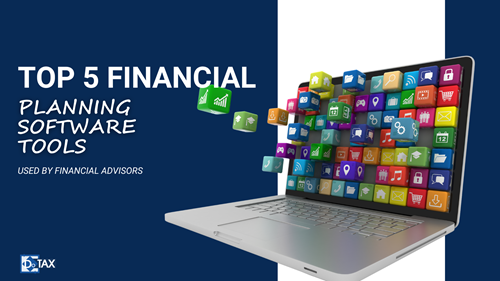
Financial advisors increasingly rely on specialized software to optimize their services and strengthen client relationships. Here’s an in-depth look at the top five programs commonly used in financial advising and why they’re essential for a competitive edge in today's market.
1. Customer Relationship Management (CRM) Systems
A robust CRM system is foundational for managing client relationships efficiently. Platforms like Redtail Technology or Salesforce Financial Services Cloud are designed to streamline client communications, organize client data, track interactions, and set reminders for follow-up actions. CRMs help advisors keep track of client preferences, life events, and goals, enabling a more personalized approach. The ability to access detailed client histories and ensure smooth communication strengthens client trust and helps advisors foster long-term relationships.
2. Financial Planning Software
Financial planning software, such as eMoney Advisor and MoneyGuidePro, provides powerful tools for creating and managing clients’ financial plans. These programs enable advisors to conduct in-depth financial analyses, simulate various retirement or tax scenarios, and generate projections tailored to client needs. Financial planning software assists advisors in building a roadmap for each client, encompassing budgeting, cash flow management, and retirement planning. By visualizing a client’s entire financial landscape, advisors can offer more precise guidance that aligns with their clients’ unique life goals.
3. Portfolio Management Software
Portfolio management tools are indispensable for monitoring investment performance and optimizing asset allocation. Morningstar Office and Orion Portfolio Solutionsallow advisors to analyze portfolios in real time, rebalance investments, and track performance metrics. These platforms help advisors maintain a diversified asset allocation strategy and ensure alignment with clients' risk tolerance and objectives. Additionally, many portfolio management systems offer customizable reporting options, providing clients with insights into their investments and reinforcing transparency.
4. Risk Assessment Tools
Risk management is critical in advising, and tools like Riskalyzehelp advisors assess and quantify clients’ risk tolerance levels. Through scientifically designed questionnaires and predictive algorithms, these platforms determine a client’s comfort level with risk and suggest suitable investment strategies. Risk assessment software also allows advisors to simulate market conditions and assess portfolio performance under various scenarios, providing clients with confidence in the resilience of their investment plans. Tailoring portfolios to match clients' risk profiles not only enhances satisfaction but also aids in achieving long-term objectives without unnecessary volatility.
5. Research and Data Analysis Platforms
Real-time market data is essential for informed decision-making, and tools like Bloomberg Terminal and FactSet provide financial advisors with a comprehensive suite of research, data analysis, and news resources. With access to live market data, economic indicators, and sector-specific news, advisors can stay updated on factors that may impact clients’ investments. These tools enable a data-driven approach to portfolio adjustments and make it easier to respond proactively to changing market conditions.
The Benefits of Integrated Financial Software
Using these specialized tools collectively streamlines workflow, enhances productivity, and minimizes administrative burdens for advisors. Integrated platforms—such as those combining CRM, financial planning, and portfolio management—simplify data access and allow for seamless client interactions, contributing to greater efficiency.
Adapting to Client Needs with Advanced Technology
As client expectations evolve, adopting advanced technology is crucial for financial advisors who aim to stay competitive and responsive. Clients today expect instant access to financial data and easy communication with advisors, and these tools enable advisors to provide a comprehensive and real-time advisory experience. With the ability to simulate different financial scenarios, generate custom reports, and offer precise risk assessments, advisors are empowered to provide tailored solutions that inspire confidence.
Conclusion
Why Investing in Financial Software is a Wise Choice The financial advisory field is transforming rapidly, and leveraging the right technology is no longer optional—it’s essential for success. Tools like CRMs, financial planning software, and risk assessment platforms help advisors cater to the increasing demands of their clients, making the investment in these technologies a valuable choice. Ultimately, by providing efficient, customized, and transparent services, financial advisors can cultivate strong relationships and position themselves as trusted partners in their clients’ wealth-building journeys.